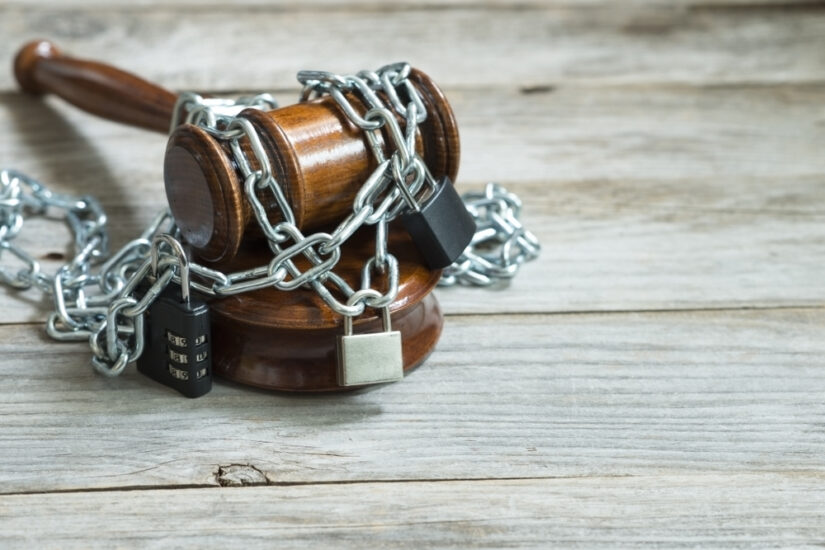Obstructing justice is a crime in Florida, but not everyone that is accused of it is guilty. Facing criminal charges can be a terrifying situation. If you’re unsure what to do, start by hiring a legal team that cares about helping you and upholding justice.
Stroleny Law: Criminal Defense Attorney takes a personalized approach to serve every client. When you need a criminal defense attorney in Miami, we are the legal team that will be there for you in your time of need.
Whether you’ve made a mistake or were in the wrong place at the wrong time, our Miami criminal defense team will provide compassion and take a direct approach to work out your best possible outcome. Contact us today for a free case evaluation.
What Is Considered Florida Obstruction of Justice?
Many types of offenses are classified as obstructing justice. These activities are found in Florida Statutes, Chapter 843, and are defined as interfering with an officer carrying out their duty.
Under Florida law, an officer can be a law enforcement officer, a correctional probation officer, a peace officer, or an officer of other governmental agencies. As obstruction of justice is a broad umbrella term, many people do not realize that they are engaging in illegal activities that could be deemed a criminal offense. You may be aware that it’s illegal to impersonate a police officer. However, what may be less obvious is that a charge for obstructing justice may be brought if you attack police horses or even a fire dog working with the fire department.
What Is Evidence of Obstruction of Justice?
In order for the prosecution to charge you with obstruction of justice, they must be able to prove that you knowingly and willingly attempted to either obstruct or resist an officer who was performing their duties. Proof of this must be beyond a reasonable doubt, which is why Stroleny Law: Criminal Defense Attorney has an excellent chance of getting your charges dismissed or minimizing the penalties.
The diagram below details how the prosecution is responsible for the burden of proof in a criminal case.
In Florida, there must be proof for a conviction of any crime that involves the obstruction of justice. The prosecution’s evidence must trump your presumption of innocence. If there is even a slight chance that you are innocent, the case lacks credible evidence. This means you may be acquitted without having to present any evidence.
Expert legal representation is imperative for crimes of obstruction of justice. Contact our offices today for a free case evaluation with a criminal defense attorney who will work to pursue justice for your defense.
Is Obstruction of Justice a Felony in Florida?
Obstructing justice can be a misdemeanor or a felony. It will depend on your specific situation. Whether violence was involved or not will also impact the outcome of your pending charges.
Looking at the more specific offenses that relate to the obstruction of justice can give you a better idea of the criminal charges you may face. If you have been charged with a crime relating to obstructing justice, don’t delay speaking with the criminal defense attorneys at Stroleny Law: Criminal Defense Attorney to get the legal representation you deserve.
What Is the Punishment for Obstruction of Justice in Florida?
When you are accused of impeding a law enforcement officer or another officer from carrying out their duties, the charges will vary. Here’s a deeper look at some of these offenses and their punishments.
Resisting and Obstructing Police Officers
If you were resisting arrest charges or obstructing a police officer, the punishment would depend on the severity of your confrontation. With Florida Statute XLVI Chapter 843.01, this charge is more serious because it involves violent resistance of an arrest. This is a third-degree felony that carries a $5,000 fine along with five years of prison time.
Under other Florida statutes, such as Chapter 843.02, resisting an arrest without violence is a first-degree misdemeanor. This carries a $1,000 fine and a one-year prison term.
The charge for resisting a law enforcement officer is often added to existing charges. You may be accused of resisting arrest by voicing your opinion or walking away. This is why speaking with our criminal defense attorneys is the first move you should make after an arrest that involves resisting an officer.
Obstruction by Wearing a Disguise
A disguised person doing so to hinder a law enforcement officer, arresting officer, or correctional officer is also obstructing justice under Florida law. This crime is punishable as a first-degree misdemeanor with up to one year in prison.
Giving False Information to a Law Enforcement Officer
If you knowingly and willfully provide the wrong information to law enforcement officers or a law enforcement agency, Florida Statute Section 837.055 states that it is a misdemeanor in the first degree. You could face up to one year in prison and a $1,000 fine. However, false information that impedes law enforcement officers from finding a missing child aged 16 or younger becomes a third-degree felony with steeper penalties.
Illegal Possession of Concealed Handcuff Key
Another Florida statute forbids the illegal possession of a concealed handcuff key. This is a third-degree felony punishable with prison time of up to 5 years and $5,000 in fines.
Refusing to Assist Prison Officers or Peace Officers
Anyone that refuses to help a prison officer arrest an escaped convict can also face punishment with a first-degree misdemeanor. This carries a $1,000 fine and the possibility of up to one year in prison.
Likewise, not helping a peace officer who is assisting a law enforcement officer, members of the Florida Highway Patrol, a watchman, or another officer is grounds for a second-degree misdemeanor.
Revealing Private Information About a Police Officer
You may be surprised to learn that it’s illegal to release private information about a police officer, such as their home address and phone number. However, there must be proof beyond a reasonable doubt that you did so in a spiteful way with the intent to disrupt their legal duties. For obstructing justice in this way, it is a misdemeanor in the first degree.
Harming Police Animals
The animals that work with a police officer are also considered law enforcement officers. Even police dogs or police horses are treated with the same esteem as human law enforcement agents. The punishments for bringing harm to them can range from misdemeanor to felony.
Unlawful Use of Police Communications
In the state of Florida, civilians are not permitted to interfere with police communications. Intercepting transmissions can result in a second-degree misdemeanor with a $500 fine and up to 60 days in prison. It’s also a misdemeanor to steal a device used for these communications.
Depriving a Crime Victim Who Needs Medical Attention
It is also an obstruction of justice for anyone to deprive a victim of a crime of the medical care they need. This can become a third-degree felony if the medical condition worsens in custody. If the victim dies because of a lack of medical attention, it will be a second-degree felony, punishable with $10,000 in fines and jail time up to 15 years.

Other Situations That Involve Obstructing Justice
In addition to resisting an officer and each criminal offense listed above, the following situations can be deemed as obstruction of justice:
- Bringing tools into jail to help aid an escape
- Taking an officer’s items of protection or communication
- Falsely impersonating a police officer
- Harassing an individual in a neighborhood watch program
What to Do When Facing Obstruction of Justice Charges
Perhaps it was not your intent to resist arrest, or you did not make a voluntary action with the intent to commit unlawful acts. Whatever the case, when you are facing charges of obstruction of justice, you should not leave anything to chance.
This is why you need the award-winning Miami criminal law team with a former state prosecutor on the case immediately. Our attorneys can take preventative measures against convictions and penalties.
After a person is charged with obstruction of justice, they must be informed of their rights. The only way to become informed about them and the legal process is by retaining an experienced criminal defense attorney. Get the effective legal representation you need with Stroleny Law: Criminal Defense Attorney, providing free consultations 24 hours a day, every day of the week.
With a client-focused approach to legal services, our firm becomes your voice in the legal process. We extensively pursue every possible option to make your defense and fight for a dismissal or an amendment to lesser charges.
Work with our Miami firm, and you’ll have the best chance of getting these charges dismissed to protect your future and your freedom. Contact us today to discuss your case with compassion and confidentiality.




